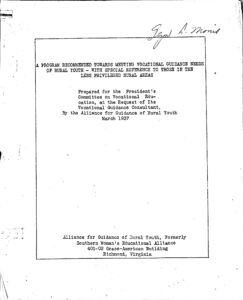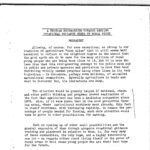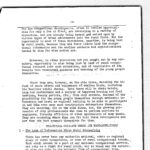Pine Mountain Settlement School
Series 13: EDUCATION
1937 Vocational Guidelines

EDUCATION 1937 Vocational Guidelines
TAGS: education, vocational guidelines, vocational guidance needs of rural youth, Alliance for Guidance of Rural Youth, agriculture as an occupation, new occupational developments, vocational counseling, need for rural occupational research, need for rural placement bureaus, National Youth Administration, Works Progress Administration, National Vocational Guidance Association, President’s Committee on Vocational Education, U.S. Junior Employment Service
Transcription: 1937 Vocational Guidelines
[Note: The following transcription has been slightly edited for clarity.]
001 – Title page
[Handwritten notation at top of page: “Glyn A. Morris“]
A PROGRAM RECOMMENDED TOWARDS MEETING VOCATIONAL GUIDANCE NEEDS OF RURAL YOUTH WITH SPECIAL REFERENCE TO THOSE IN THE LESS PRIVILEGED RURAL AREAS
Prepared for the President’s Committee on Vocational Education, at the Request of Its Vocational Guidance Consultant, By the Alliance for Guidance of Rural Youth, March 1937
Alliance for Guidance of Rural Youth, Formerly Southern Woman’s Educational Alliance
… Richmond, Virginia
002 – Page 1
A PROGRAM RECOMMENDED TOWARDS MEETING VOCATIONAL GUIDANCE NEEDS OF RURAL YOUTH
PREFATORY
Allowing, of course, for some exceptions, so strong is our tradition of agriculture “uber alles” that it still seems half heretical to reflect to the slightest degree on the utmost that the good earth can do to care for the many millions of rural young people who are being born close to it. But it is nonetheless true that this over-powering concept in the public mind and in public and private agencies and provisions is more than half throttling vitally needed progress along other lines in its very beginnings in thousands, perhaps even millions, of so-called agricultural communities. Naturally agriculture is basic and must be fostered: but, its limitations are many.
The situation would be greatly helped if national, state, and other public thinking and programs showed realization of the fact that agriculture has been a declining occupation since 1870. Also, if it were known that in the more prosperous farming areas, where agricultural machinery most abounds, this fact in itself continues, with increasing rapidity, to reduce the percentage of people needed for farming, much more attention would then be given to other possibilities for earning.
Such an opening up of other small possibilities and the gradual expansion of them through adequate vocational guidance training and placement in relation to them, is, for very many of these communities, the only hope, and a highly interesting one too as regards either rural living itself or the power of rural areas to hold these young people who are their best hope for the future.
This is not to say that many of these communities seem likely to develop any large manufacturing concerns, or that they should even concentrate to any degree on a single industry, but that, in the wake of improving roads and schools, of prospects for rural electrification and this and that, chances…
003 – Page 2
…for, often to involve opportunities for only a few at first, are developing in a variety of directions, and are already being sensed and seized upon by various types of urban adventurers into the rural field. But the opportunity in most of these directions, meantime, is being lost by rural youth, because they and their elders lack the occupational information and the earlier contacts and sophistications needed by them for wise action now.
Moreover, in other directions not yet sought out by any outsiders, opportunity is also being lost by lack of rural occupational research into such situations, and of translation of its results into vocational guidance and training of the young people themselves.
There they are, however, on the side lines, watching the in-rush of chain stores and businesses of various kinds, including the business school chains. Soon there will be chain hotels, inns, and restaurants and a variety of improved housing and food services, beauty parlors, etc., from city centers, instead of the possibility for the young people themselves through authentic information and local or regional training to be able to participate in and take over many such constructive enterprises themselves. They are watching, out on the side lines, too, the growing procession of city professionals who come to perform services as engineers, forestry officials or other specialists of many kinds. They are wondering where they can fit into these developments and how they can best prepare themselves for them.
VOCATIONAL GUIDANCE NEEDS AND RECOMMENDATIONS
I – The Lack of Information About Rural Occupations
There has never been any authentic national, state or regional study of rural occupations, or even of rural occupational trends. Such study should be a part of any national occupational service, not only as a right for rural youth, but to round out the national view and take in the national flow of occupational life.
Fact finding is needed now as never before about actual and possible rural occupations of the community, the county and the region. This information is basic to vocational counseling,…
004 – Page 3
…vocational education, and placement.
Continuously to date the vague concept of agriculture as 100% opportunity for rural youth or nearly so is throttling the public mind, public sense of responsibility and most of such public and private agencies as are interested in rural youth, as well as most plans and provisions made in its behalf. Such a concept is disastrously out of date and needs revamping from every point of view. Rural occupational research translated into actual balanced vocational guidance information is the answer and the provision for it is vital to national welfare as well as to rural youth.
II – Vocational Counseling
This is a double need because all rural young people face potentially the necessity for decision about going to the city. In countless communities they face the necessity for moving to other areas for any success in farming. Most rural regions are in highly transitional stages at present because of road development, improving schools, rural electrification, problems concerned with agricultural opportunities, and so forth. Every rural boy and girl needs personal interpretation of these transitional changes.
Vocational counseling requires, besides the flow of occupational information mentioned above, counselors trained in the study of the individual, and otherwise prepared for guidance service. There is little expectation that the smaller rural schools will ever have special counselors. Teachers in these schools must be prepared to serve under a trained itinerant county counselor or supervisor as teacher counselors. High schools cannot function effectively for vocational guidance without provision of appreciable time for individual counseling, record keeping, etc.
Subsidy for vocational education programs should include provision on grade school levels for vocational guidance supervision…
005 – Page 4
…and teacher training on the job both in special institutes and in follow-up itinerant supervision of a trained county counselor or supervisor. High school teachers should have had or secure longer time courses in guidance, besides training on the job. A school counselor must also coordinate guidance activities there, with time allowance from teaching.
Some typical guidance problems of rural young people
- Change of residence.
Maximum need for rural counseling in vast numbers of rural areas because of the problem of whether to go elsewhere or stay confronts rural young people, as it does not automatically confront urban ones.
e.g. Going to the city
Going to better farming areas.
However, there is no provision through government agencies — NYA, WPA, Adult Education, etc.– for rural vocational counseling or guidance for either in-school or out-of-school youth.
- The place of agriculture in the county outlook. Its place in his or her vocational future — there or elsewhere.
- Chances in non-agricultural jobs and occupations needing local development.
- Possibilities in kinds of agricultural occupations other than farming and the training needed for them.
- Various other special vocational guidance needs have already been implied in earlier sections of this outline.
III – Vocational Education — Recommendations
Presupposing occupational fact finding, study of the individual boy and girl, and counseling in the selection of training, as based on resulting information, the following recommendations are made in regard to vocational education. All of its basic features have already been approved by the trustees of the National Vocational Guidance Association and are being in-…
006 – Page 5
…corporated into its own recommendations to the President’s Committee on Vocational Education, as the report of the NVGA Rural Section. This the writer of this present report directs.*
For Elementary Schools — Because grade schools are still terminal of education for from 70 to 95% of rural youth in especially underprivileged areas, and their lack of training brings grave social consequences, it is recommended that basic instruction be made available in these schools:
In shop work, use of tools, chiefly for home repairs, and the making of simple useful home articles, e.g. pig troughs, gates, etc.
In simplified home economics with home and school practice: — in care of children, food preparation and service and other home assistance. Note: Details concerning this were worked out and are available through Miss Clara Brown of the President’s Committee.
In agricultural projects and through interpretation of local conditions affecting agriculture.
Purposes to be served by such instruction include home improvement, exploration of interests and abilities, development of some earning power as aid to further education, through assets for part time employment, beginnings of training, etc.
Procedure suggested
(1) Experimentation and demonstration at first in a few groups of schools representing different types of areas.
(2) Provision of itinerant instructors to train teachers in small schools — first by institutes and then through school visiting and supervision.
*This part of the report, especially that concerning home economics simplifications, has been worked out in much consultation with Miss Clara Brown of the President’s Committee Staff. On the outline for shop work, the editor was especially advised by Dr. Fred C. Smith, Dean of the University of Tennessee; Leonard M. Miller, Supervisor of Guidance in Rockland County, N.Y.; Otis Amis of the Kentucky NYA and others.
007 – Page 6
Dr. Fred C. Smith suggests that, with average road conditions, 10 schools might be included in a group, with a half day a week spent by the instructor at each school. This would vary with local conditions. Local possibilities for equipment would usually need supplementing.
Such training opportunity should begin at least with the end of compulsory education, and as much earlier as possible.
For High Schools Are Needed
Constant provision for exploration and tryout.
Broader realization of and approach to the underlying problems of vocational education in high schools in such areas.
As a part of this, more emphasis upon basic skills for all, especially in shop work that can be turned towards various specializations.
Avoidance of too early specializations, but opening up of a wider range of occupational vistas.
Less emphasis upon vocational agriculture in areas unfavorable to agriculture, but opportunity for all students, through shorter time requirements, to acquire agricultural intelligence and out- look as well as some skills through simple projects. The same generalization applies to home economics, and there is urgent need that such teachers be, on the average, far better prepared to meet rural problems. At every point, closer correlation of any vocational educational offerings with general guidance objectives and procedures in the concept of well rounded development of the individual boy and girl. As at present constituted, conditions for securing such offerings, often, unintentionally, force much misguidance upon the schools. On the other hand agricultural and home economics high school curricula contain important guidance factors in emphasis upon home visits and projects.
Regional Vocational Schools
Throughout much consultation, general approval was found of a plan for regional schools if they were to carry the implications…
008 – Page 7
…already set up here as to vocational guidance in relation to vocational education. This would necessitate:-
Regional occupational research for determining the occupations for which to train, primarily, although not exclusively, counseling to any extent needed, in the light of such research.
Counseling regarding occupations outside the area.
Placement and provisions, when desirable, for tryouts and apprenticeships.
Regional schools would probably require dormitories from the beginning. County schools might operate from the beginning through bus transportation, although students from parts of almost any county would need local accommodations, and should come with some skill to help to earn this. Federal student aid, midway in amount between that for high school and for college students, could reasonably supplement this. In some cases, excellent mission school plants might conceivably be offered for initial experimental programs.
Some Groups Who Might be Served by Regional Vocational Schools
Those desiring to specialize beyond the high school level in trades, industries or other occupations characteristic of the region involved or of such types of regions.
Others, who could wisely undertake the training on lower educational levels, with help in rising to levels needed during the training.
High school graduates exploring themselves in relation to later training on professional levels.
Miscellaneous types of students, as might present themselves convincingly for admission.
Suggested Types of Training — based on continuous survey of area occupational needs and possibilities, and on study of individual needs.
Fundamental shop work for those needing it.
Such specializations as auto-mechanics, electrification of various types.
009 – Page 8
Such building trades as carpentry, brick and stone masonry Food and housing occupations other than building ones.
Personal service occupations of kinds suited to such regions.
Miscellaneous.
IV – Placement
There is a major need for rural junior placement bureaus grounded in guidance. Insofar as we know, none have been established by the NYA federal program and the U.S. Junior Employment Service, jointly or separately, and there seems to be authority for the assumption that no such plan is in view.
This omission means, of course, the following conditions:
This lack of placement leaves argument for high school education in the minds of rural young people very unsatisfactory as to rural opportunities even if training is secured. It is also a ground for their resentment as to being discriminated against.
It encourages undue emphasis on seeking occupation in the city because placement centers are to be found only there.
It increases the national tendency to neglect provision of information about rural occupations, because there are no rural placement centers to require them.
Furthermore, since lack of rural occupational research and of rural placement bureaus renders the placement centers which do exist incapable of advising adequately about rural occupations, rural young people seeking placement through such centers are naturally unlikely to return to their own areas in jobs secured. This further depletes rural areas of many young people competent to develop new occupations in rural areas. Rural areas need their own junior placement centers, and it is vital to both national and rural welfare for such centers to be provided.
GALLERY: 1937 Vocational Guidelines
- 001 vocational_guidelines_00001
- 002 vocational_guidelines_00002
- 003 vocational_guidelines_00003
- 004 vocational_guidelines_00004
- 005 vocational_guidelines_00005
- 006 vocational_guidelines_00006
- 007 vocational_guidelines_00007
- 008 vocational_guidelines_00008
- 009 vocational_guidelines_00009
Return To:
EDUCATION Guide










